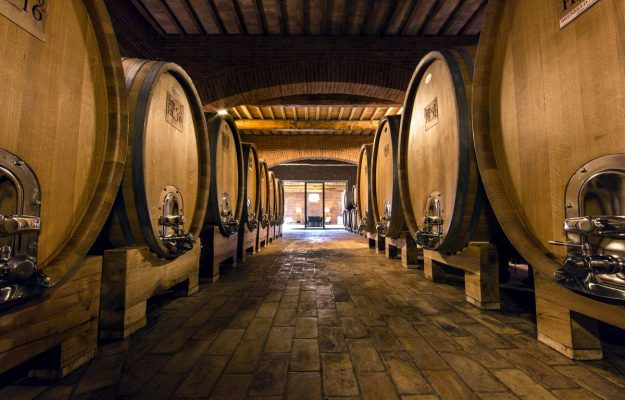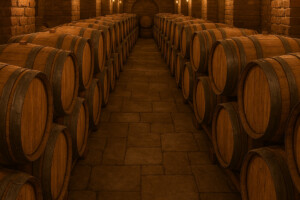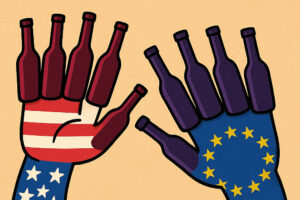While the first financial statements of Italian wineries showed a decidedly positive first half of 2021, analysis of the most up-to-date data (some as of September 2021, others even as of December 2021) confirms the recovery of the ground lost in 2020, bringing turnover to levels in line, if not higher, with 2019, the last year of normality before the pandemic. This is a trend that unites everyone, because those who suffered most in 2020 with the closure of bars and restaurants in Italy and abroad experienced a powerful rebound in sales, while companies that have always preferred the large-scale retail channel continue their growth path, at a slower pace, but after having come through the darkest year for consumption unscathed. Behind the figures analyzed by WineNews (by Tommasi Family, Tenuta Sant’Antonio, Cantina Terra del Barolo, Cantina Produttori di Valdobbiadene, Fantini, Cantina Vignaioli del Morellino, Italian Wine Brands, Cantina Valle Isarco and Vallepicciola) there are different territories, sizes and entrepreneurial skills, united by investments at all levels and rosy prospects also for 2022, after having marked growth between +5% and +58% in 2021.
Tommasi Family Estates, the Tommasi family group, a Valpolicella griffe with properties in Lugana, Montalcino, Tuscan Maremma, Basilicata, Puglia, Oltrepò and Umbria, on a production area of 764 hectares under vine, (of which 165 will come into production between 2022 and 2023) closes 2021 with a positive balance sheet, recovering the positions of 2019, with a turnover of 30 million dollars, equal to a growth of 11% compared to 2020, and a production of 3.5 million bottles, 80% of which are exported abroad, where North America and North Europe count for 30% of exports, but also South Korea and Japan give satisfaction. “2021 was complicated due to the management of the lack of raw materials, the difficulty of planning, but it closed much more positively than 2020 thanks to the relaunch of the Horeca sector in Italy and worldwide, the solid relationships with our business partners, the collaboration of our stakeholders and above all thanks to the great ability to adapt and flexibility with the team of our employees”, comments the group's chairman, Dario Tommasi. “I am confident that the positive trend we have recorded in recent months will continue and I believe a return to pre-pandemic levels is possible by mid-2022. For our company, the Horeca and Retail segments each account for 50% of the company’s business: this gives a measure of how complex it was to exit 2020 without the contribution of catering. The year 2021 has marked a clear turning point and the country has fortunately reached awareness and maturity such as to prevent new closures”, concludes Dario Tommasi.
Remaining in the Veronese area, Tenuta Sant’Antonio, owned by the Castagnedi family, closed 2021 with a 23% increase in sales in 2020, a positive trend confirmed by the 20% increase over 2019, when stability in the sector was considerably greater. This growth goes hand in hand with an increase in the number of hectares, now 150, and consequently of bottles produced: +10% to 1.8 million. These results were also made possible by the investments, amounting to 3 million euros, made during the pandemic, and which concerned all production areas, from logistics to the vineyard and cellar, in the name of efficiency and sustainability. “The results reflect our work, our daily dedication and our desire to be faithful to what we do best: producing wine. As the Castagnedi family, we have embarked on a profound evolutionary process that is leading us towards an increasingly sustainable approach”, says Armando Castagnedi, who leads Tenuta Sant’Antonio together with his brothers.
The balance sheet of Terra del Barolo, as at August 31, 2021, shows numbers that exceed expectations: a net profit of 1.5 million euros and a turnover that exceeded 20 million euros and a production of over 3.5 million bottles. “These are unprecedented levels, which confirm, even in this particular year, the affection of consumers around the world for the wines of Langa”, says Paolo Boffa, president of Terre del Barolo. “In the face of the global situation, involved in the pandemic, the result is extraordinary because our wines have grown in quantity and value in the major and emerging markets through all the main sales channels”.
The turnover of the Cantina Produttori di Valdobbiadene group and its subsidiary Val D'Oca, which markets and promotes the wines produced from the grapes grown on the 1,000 hectares of vineyards belonging to the 600 members of the cooperative winery, one of the most representative of Valdobbiadene Prosecco Superiore, grew by almost 20%. In the last financial year, turnover rose from 47 to over 56 million euro and production increased from 13 to 15.8 million bottles. Exports also grew double-digit in the last financial year, especially to Russia, where the winery has an important presence in the large-scale retail trade, and to the Scandinavian region. New acquisitions include China. For the future, the winery - which has been selling online since 2010 - also intends to strengthen its e-commerce, which currently generates a little less than 2% of turnover, and with a major investment aims to raise this to 5% in three years. In terms of production, the intention is to concentrate increasingly on the terroirs of excellence: the winery already manages 37% of the 494 hectares of the Rive del Conegliano Valdobbiadene, and over 10% of the Cartizze.
Fantini (formerly Farnese Vini), which started from Ortona in Abruzzo, has gradually become the leading exporter in Southern Italy, with over 28 million bottles, thanks to a careful policy devoted to quality research and marketing. 2021 reaffirmed all the difficulties of the Horeca sector, which before the outbreak of the pandemic was Fantini’s core business. And yet, already in 2020 the group had successfully attacked the off-trade channel, so much so that it closed with a turnover in significant growth. 2021 went even better, the increase became double-digit - +11.7% - meaning a turnover of almost €91 million, up from €80 million in 2019. And if some clouds remain on the horizon - the pandemic, but even more so the generalized increases in raw materials and energy, a phenomenon that is affecting the sector throughout Europe - Valentino Sciotti, founder and CEO of Fantini, is nevertheless indulging in optimism, expecting a further positive sign for 2022: the budget forecast is 96.35 million euros in turnover, with a more subtle growth in bottled wines due to the drop in grape production. “2021 was a difficult year, but in the end, it went very well for us, we must be really satisfied. Now I don't hide a reasonable concern about the disproportionate and generalized increase in the cost of dry materials and energy, and the drop in grape production in 2021, with the multiplier effect on prices themselves. The pandemic is still biting and generating limitations that do not allow us to operate as we would like in terms of promotion on foreign markets. Yet I believe I can be optimistic: there are all the conditions for Fantini to continue its growth”, comments Valentino Sciotti.
Positive results (as at August 31, 2021) also for the members of the Cantina Vignaioli del Morellino di Scansano, with results that exceeded expectations, thanks to a 5% increase in turnover, to 13.7 million euros. “This result”, commented President Benedetto Grechi, “was possible above all thanks to the excellent work done with the large-scale organized distribution channel, which recorded an 8% increase. The catering channel was, as expected, more penalized by the pandemic situation, but the overall decrease in the Horeca channel was only 7%, thanks to the fact that part of the sales in this channel were diverted to wine shops, where take-away was still possible (+22%). Exports also saw a limited fall thanks to the fact that we have worked on several markets. E-commerce, on the other hand, grew, following a nationwide trend and not only in this period, with an increase in turnover of +34% after the positive results already seen in 2020. “It is also with this in mind that the winery has decided, in agreement with the other wineries in The Wine Net network, to join forces and group its online product offerings in a new site, unique for all the wineries in the network, also taking advantage of the fact that most consumers turn to specialized sites rather than directly to producers, probably for a wider choice of wines”, adds Grechi. Sales in the wine shop also grew, a result made possible by the promotion of cellar visits and tastings, despite the pandemic context, allowing the winery to close the year with a 13.5% increase in turnover, even surpassing the figures from before the pandemic. “We are also proud”, concludes Grechi, “that the average price of bottled wine rose by 4.4%. This shows how the winery’s work to enhance the quality of its wines, and Morellino di Scansano in particular is producing the results we expected”.
The acquisition of Enoitalia (finalized in July 2021) leads the Italian wine brands group to close its 2021 financial statements with revenues of €408.9 million, essentially doubling (+100.1%) compared to 2020. The company listed on Borsa Italiana’s Aim market confirms its position as Italy’s leading non-cooperative wine group, and in addition to the contribution of Enoitalia (which closed 2021 with revenues of 208.4 million euros), Italian wine brands’ revenues grew thanks to further strengthening of foreign markets (332.3 million euros and +102.55% on 2020) and a greater presence on the Italian market (75.7 million euros and +91.4%). Considering distribution channels, large-scale distribution and state monopolies are strengthening, while direct sales to private individuals have held up thanks to the resilience of the e-commerce and traditional business model. “In 2021, we became Italy’s leading private wine group in terms of turnover”, says chairman and CEO, Alessandro Mutinelli, “a goal we promised our investors when we listed in 2015”. After Enoitalia, the company acquired a majority stake in Enovation Brands in the US, strengthening the group’s activities and diversifying its channels. In the meantime, scouting activities continue with a view to new acquisitions while, from a financial point of view, Italian wine brands could leave the Aim segment to make the big leap onto the main market, as Alessandro Mutinelli announces: “the size achieved is propaedeutic to the start of work to move the stock onto the main market”.
Cantina Valle Isarco, a young South Tyrolean wine cooperative, also had an excellent 2021, closing its accounts in August 2021 with a turnover of €6.3 million, for 900,000 bottles sold, recording 18% growth compared to 2020 and +3% compared to 2019. The final months of the year were even better, with the South Tyrolean cooperative posting +37% over the same period in 2020 from September to December 2021. “This is an extremely satisfying trend that gives us hope for this 2022 that has just begun”, comments Armin Gratl, general manager of Cantina Valle Isarco, “but it is too early to make predictions, although given the trend of the last few months we are very confident, and we hope to end the year with a higher turnover than last year, with a percentage increase of 15 points, which for us would mean increasing turnover by around one million euros”.
Finally, in the heart of Chianti Classico, in the Uga di Vagliagli, Vallepicciola closed 2021 with a 58% increase in turnover, which allows us to look to 2022 with a certain confidence and important objectives: in 2022 we are aiming for 380,000 bottles sold, 60% of which are abroad, which will become 600,000 in 2025, when all of the winery’s 105 hectares of vineyards will be in production. “For 2022 I am optimistic, because after the emergency”, says Managing Director Alberto Colombo, “people will want to go back to the restaurant and consume good wines, the important thing is to differentiate ourselves, expand and enhance the communication, enhancement and promotion of our wines by adapting to the changes in the wine world, and that is why we are preparing several important activities and events for 2022. Although there are great expectations of emerging markets such as China, India and Brazil, the historic markets for Italian wine (North America, Northern Europe, Germany, Switzerland and Japan) continue to be those that give the best guarantees of continuity year after year. These markets are very attentive to the real quality of wine and therefore expect a constant high level of quality, vintage after vintage. In emerging markets and in markets with few Italian restaurants, such as China, the consumer has little knowledge about wine consumption, and it is, therefore, difficult to build loyalty because they are distracted by offers from countries with very competitive prices, for example, Australia and South America”.
Copyright © 2000/2025
Contatti: info@winenews.it
Seguici anche su Twitter: @WineNewsIt
Seguici anche su Facebook: @winenewsit
Questo articolo è tratto dall'archivio di WineNews - Tutti i diritti riservati - Copyright © 2000/2025

























































































































































































